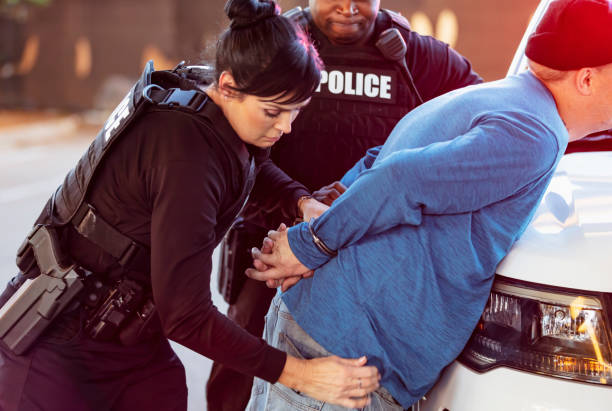A strip search involves removing more than just outer clothing, such as coats, hats, gloves, shoes, and socks. In Australia, police officers and correctional staff can conduct strip searches. Here are some common reasons why police conduct a strip search:
1. Reasonable suspicion: Police officers can conduct a strip search if they have reasonable suspicion that a person is carrying an unlawful item, such as drugs, weapons, or stolen property.
2. Arrest: Police officers can conduct a strip search if they have arrested a person for an offence or warrant, and the officer suspects on reasonable grounds that it is prudent to do so to ascertain if they are carrying anything that could present a danger to a person or could be used to assist a person to escape from lawful custody
3. Serious and urgent circumstances: Police can conduct a strip search in serious and urgent circumstances, such as when there is a risk to public safety or when there is a need to prevent the destruction of evidence.
Although, these searches can be intrusive and can raise concerns about privacy and human rights. That’s why a lot of people may even refuse to undergo one. In this article, we will delve into the intricacies of strip searches in Australia. We will also explore its definition, procedures, legal implications, and potential consequences of refusal.
Key takeaways
- A strip search is a search that involves removing more than just outer clothing.
- In Australia, police officers and correctional staff can conduct strip searches.
- They must conduct strip searches in an area where the person cannot be seen by anyone else, nor by anyone of the opposite sex, except an appropriate adult.
- The police officer must conduct the strip search as quickly as possible and allow the person to dress as soon as the search is complete.
What Does the Crimes Act 1900 (ACT) Say?
According to Section 228 of the Crimes Act, regarding strip searching:
- Authorities must conduct the search in a private area.
- If the person being searched is under 18, a court order is required for a strip search unless the person has been arrested and charged.
- A police officer of the same sex as the person must conduct the search.This is the case unless no same-sex officer is available.
- The search must not involve the search of a person’s body cavities.
- The search must not involve the removal of more garments than necessary to determine whether the person has the item searched for or to establish the person’s involvement in the offence.
- The search must not involve more visual inspection than necessary to establish the person’s involvement in the offence.
- If any of a person’s garments are seized as a result of a strip search, the authorities must provide the person with adequate clothing.
Exceptions to the rules
1. Authorities must conduct the search in the presence of a medical practitioner of the opposite sex to the person searched. This is true if a medical practitioner of the same sex as the person being searched is not available within a reasonable time.
2. They may conduct the search in the presence of a parent, guardian, or personal representative of the person. The person should have no objection to the other person being present.
3. If no police officer of the same sex as the person is available to conduct the search, any other person of the same sex as the person may conduct the search if they have a police officer has requested them to do so.

What Does the Law Enforcement (Powers and Responsibilities) Act 2002 NSW Say?
The Law Enforcement (Powers and Responsibilities) Act 2002 (LEPRA) grants police officers the authority to conduct searches on individuals at the time of arrest or during the arrest process. This authority also extends to officers who are present at the scene of an arrest. Section 27 of LEPRA outlines the specific conditions under which authorities can conduct the search:
- Reasonable Suspicion: The officer must have a reasonable belief that the person is carrying an item that poses a danger to others, could aid in their escape from lawful custody, is evidence of a crime, or was used in the commission of an offence.
- Privacy: They must conduct the search in a private area, to the extent reasonably practicable under the circumstances.
- Expeditiousness: The search must be conducted as quickly as possible.
- Same-Sex Officer: The searching officer must be of the same sex as the person being searched.
- Privacy from Opposite Sex: The search must not be conducted in the presence or view of a person of the opposite sex unless there is no objection.
- Reason for Search: It is crucial to adhere to the provisions of Part 15 of LEPRA. This includes the obligation to inform the person being searched of the reason for the police strip search.
FAQs About Strip Search in Australia
Q: What information must the police provide before conducting a strip search?
A: Before conducting a search, the police must inform you of the following:
- Identity: If they are not in police uniform, they must provide evidence that they are police officers.
- Name and station: They must state their name and the police station they are affiliated with.
- Reason for the search: They must explain the reason for the search, such as the suspicion that you are carrying drugs or weapons.
- Legal obligation: They must inform you that you have a legal obligation to comply with the search.
Failure to provide this information may render the strip search unlawful, with the exception of disclosing their name and place of duty, unless you specifically request this information.
Q: What if I refuse a search?
A: You should always comply as long as the search is lawful and authorities took necessary steps before conducting the search. You may seek legal advice if the strip search was unnecessary and unlawful.
Q: How should police conduct their search?
A: Police must:
- Inform you of the reason for the search
- Inform you if you will need to remove your clothing
- Request your cooperation
- Conduct the search in a private area, as far as reasonably practicable under the circumstances
- Conduct the search as expeditiously as possible
- Ensure that the police officer conducting the search is of the same sex as you
- Avoid conducting the search in a location where individuals of the opposite sex can observe
- Only conduct the search in the presence or view of a person whose presence is necessary for the purpose of the search
If anyone has a complaint about the conduct of NSW Police, they can make it to the commissioner of police or to the Law Enforcement Conduct Commission.

What if the Strip Search Was Unlawful?
Strip searches are a highly intrusive and controversial practice that authorities can only conduct under specific circumstances. If you believe you have experienced an unlawful strip search, it is important to seek legal advice immediately. JB Solicitors is a team of experienced criminal lawyers who can help you understand your rights and protect your interests.
We will thoroughly review the circumstances of your case and determine if authorities have violated your rights. If so, we will take legal action to ensure that you receive the compensation you deserve. We understand that undergoing an unlawful strip search can be a traumatic experience. We will provide you with compassionate and personalised support throughout the legal process.
Contact us today for a consultation. We are here to help you get the justice you deserve.
